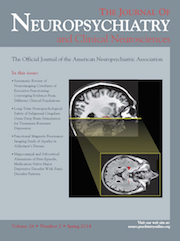Case Report
A 71-year-old man with idiopathic PD was on L-dopa, pramipexole, amantadine, and rasagiline treatment for 10 years. He also had diabetes mellitus and hypertension but no history of alcohol or drug abuse. His daughter complained about his excessive fixing of furniture (sofa bed) and electronic devices (television and radios). The recommended treatment dose was 3 mg/day, but he had started using larger doses up to 12 mg/day of pramipexole and 750 mg/day of L-dopa with developing peak-dose dyskinesias and motor fluctuations for 3 years, and he stopped taking amantadine treatment. He said that he could not stop fixing objects because of his irresistible desire to repair them. He was diagnosed with impulse control disorder (ICD) and after stopping amantadine, his ICD was worse. Quetiapine 25 mg/day dose was given and increased to 400 mg/day, and pramipexole dose was gradually decreased to treat punding behaviors. However, there was no improvement with these treatments and punding behaviors continued. Two months later, his daughter found him trapped under a closed sofa bed in an unconscious state for 8 hours, resulting from head and neck trauma that he sustained while fixing the sofa bed. He was admitted to neurosurgery service, but he died from secondary complications after 2 weeks.
Impulse control disorders (ICD) are characterized by excessive shopping, pathologic gambling, hypersexuality, compulsive eating, and compulsive dopaminergic drug usage.
1 These are important behaviors because they can cause personal, financial, and familial consequences.
2 Punding is also a ICD, and it is a stereotypical motor behavior in which there is an intense fascination with repetitive handling and examining of mechanical objects, such as picking at oneself or taking apart watches and radios or sorting and arranging of common objects, such as lining up pebbles, rocks, or other small objects.
3 Punding was a cause of death in our patient with PD.
It is known that decreasing dopamine exposure is an effective way to manage ICD that occurs during dopamine treatment. In one case report, a patient with PD presenting disabling punding was reversed by amantadine without aggravating motor function.
4 Also, our patient’s punding behaviors had increased after stopping amantadine. In a study, it had been suggested that neural systems mediating the expression of dyskinesias and punding might overlap, and punding should sought systematically in PD patients presenting with disabling severe dyskinesias.
5 We report this case because aside from personal, financial, and familial consequences, ICD and punding may sometimes cause death. This should be kept in mind in PD.

